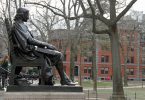By Brittany Kubicko
BU News Service
BOSTON — The Daily Free Press, Boston University’s independent student newspaper, printed their recent print edition on Feb. 21. However, on Feb. 11, the paper announced its plan to limit the print edition after being unable to publish their Feb. 7 issue due to no running advertisements and financial difficulties. The FreeP will now only print copies when there is paid advertisement running.
The FreeP’s decision shows a common trend among independent student newspapers in Greater Boston: foregoing regular print editions to produce better online content, save money and achieve greater financial stability. Some newspapers have looked into ways to not only increase advertising but include other revenue streams.
The FreeP, as well as other Boston-area student newspapers papers like the Huntington News at Northeastern University, receive advertisements from local businesses and national companies.
The Huntington News has an advertising and sales team that helps the paper find local businesses to advertise in print editions. However, the paper has had a hard time recruiting people to join the ad sales team, said Charlie Wolfson, the editor in chief of the Huntington News.
“It’s difficult because people come to the paper to write and not sell ads,” Wolfson said. “However, we’ve recruited people from around the university in all majors to help us find ads, and this has helped us become better at finding ads in the community.”
After becoming independent from Northeastern University in 2008, the Huntington News accrued debt to their printer and has worked on repaying these debts over the past two years. The paper paid off the last of the debt two weeks ago but still prints only when it has advertising and if it foresees profit from the advertisements received.
“It’s still very hard to profit off of a print edition,” Wolfson said. “We managed to do it enough, but it is still difficult to do.”
Other papers in the area have been able to keep up with printing multiple issues a week, even with declining revenue.
The Tufts Daily at Tufts University has worked on controlling their expenses and bolstering online advertising and donations to print four issues a week and pay some staff members, said Joe Walsh, former executive business director at the Daily.
“Even though publishing a print newspaper has become an increasingly challenging task, I am proud that we still manage to print four issues every week, remaining one of the smallest colleges in the U.S. with a daily print paper,” Walsh said. “We’re also proud to continue offering stipends to some members of our staff based on financial need, which helps make the paper inclusive to a wide cross-section of the Tufts community.”
Printing dues
The FreeP’s decision to limit printing revolved around a change in printing companies.
“We had a printer, and they unfortunately went out of business over winter break,” said Lexi Peery, chair of the Daily Free Press and former editor in chief of the paper. “And so, we had to scramble to find a new printer in two weeks.”
After finding a new printing company by the beginning of the semester, Peery said the FreeP needed to pay their printing dues on time, which the publication struggled to do with their old printer, Turley Publications.
“We would have trouble paying off our debts quickly enough,” said Peery, a senior at the Boston University College of Communication. “We did accumulate some debt with them. With our new printer, we knew we had to pay right on time every time we printed and we realized the best way to do that would be to only print when we had ads.”
The printing problem isn’t the FreeP’s first financial trouble. The paper was faced with paying off its $70,000 debt by the end of December 2014 to be able to print editions during the following spring semester. The paper set up a GoFundMe campaign to raise money, and with the help of a $50,000 donation from Ernie Boch, Jr., president and CEO of automotive dealership Boch Enterprises Inc., it raised all the funding needed in two days.
Kyle Plantz, the editor in chief of the FreeP at the time, said the GoFundMe campaign became successful at first with help from initial donations from small donors.
“Within the first 24 hours [of the campaign], the donations were smaller donation amounts from alumni, students, family, and friends of friends,” Plantz, who is now an editorial assistant at Science News, said. “Those were very supportive and that’s where I saw the biggest movement. If we didn’t have that, we wouldn’t have the largest amounts come in. The big people helped out and kind of sealed the deal.”
The FreeP in 2014 reduced its print circulation from four days to once a week to focus more on online content.
The FreeP in 2016 recorded a $26,423 loss at year end, spending $24,181 in printing expenses, according to the most recent tax returns of the Back Bay Publishing Co., Inc., the parent nonprofit of the FreeP.
Peery said the FreeP has gotten a small amount of revenue from community donations, their Snapchat publisher edition — a mini publication featured on Snapchat’s Discover page — and by hosting events such as FreeP Talks and the Next Edition Conference, which is happening on Feb. 24.
“It’s not necessarily going to pay for the whole year, but it does really help with our monthly expenses by having an event like this,” Peery said.
Even with financial struggles, the student editors said being financially independent from their respective universities helps their publications uphold journalistic standards and hold higher institutions accountable.
Peery said the FreeP is committed to providing the most important news to the Boston University community, despite financial struggles.
“Having our own independence in deciding what we want to publish and when we want to publish things is really important to us,” Peery said. “I think it’s important to hold powerful institutions like universities in the area to a high standard, and I think independent institutions allows you to hold them to a standard.”
Wolfson, the Huntington News editor in chief, said the separation between the publication and the academic institution is crucial.
“A lot of other publications such as different magazines on campus get money from the school and don’t have to worry about things I do,” Wolfson said. “It’s an important concept to hold the university and people on campus accountable and you cannot do that if you get money from the university.”
Correction: This article was updated to refer to the Daily Free Press as the FreeP, rather than the Free Press.






Wonderful piece! Independence is essential even though they are student newspapers without huge influential power as other commercial newspapers.